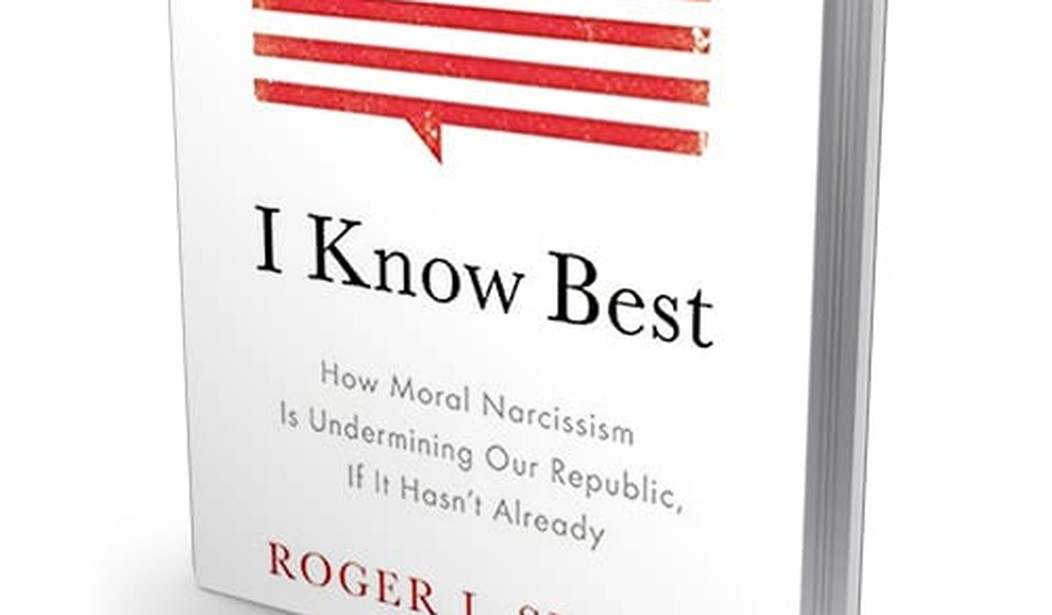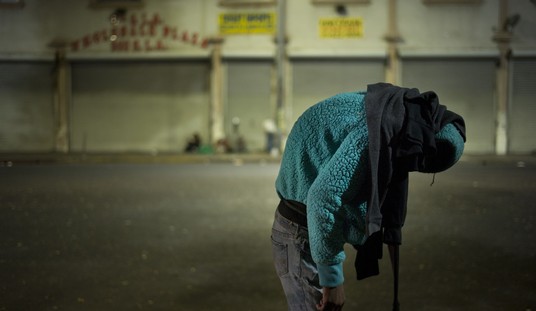In his forthcoming book I Know Best, How Moral Narcissism is Destroying Our Republic, If It Hasn’t Already (to be published June 14, now available for pre-order from Amazon), Roger L. Simon writes:
Moral narcissism is the enemy of change because it is the enemy of clear thought.
Simon — the author of ten novels, an Academy Award-nominated screenwriter, and the co-founder and former CEO of PJ Media — joins me and my partner Todd Feinburg for a wide-ranging discussion of his new book on the Harvard Lunch Club Political Podcast.
Drawing a contrast with the preening “I like my pompadour” Kardashian form of narcissism — the “all too human” narcissism so prevalent in our culture — Simon more broadly refers to our current political and philosophical culture as “an epidemic of moral narcissism.” During the interview, he describes moral narcissism as follows:
Ideas and theories and ideology … that people attach themselves to to such a degree that they define themselves because they believe in those ideas. And it doesn’t matter at all if those ideas work out in the real world; it’s how those ideas work out theoretically and are approved of by the masses.
With that concept, he weaves together an array of dysfunctional philosophies on topics ranging from global warming to Islam denialism, and from nostalgia for Marx to the establishment of an American nomenklatura.
The subtitle of Simon’s book harkens self-consciously back to that totemic work of political/psychological theory: The Culture of Narcissism: American Life in an Age of Diminishing Expectations, written by Christopher Lasch and published in 1979.
Lasch’s book — which became required reading for a legion of government and sociology majors in the ’80s — captured the disappointment and ennui of the Vietnam War and Watergate generation as the ecstasy of the revolution and its transient accomplishments ebbed. This occurred even as bourgeois society itself (heretofore the target of the movement) seemed to falter in its ability to provide for prosperity and the promise of a brighter day.
If Lasch’s book was about the demise of public Man — as despair about the future forced him to withdraw into self-indulgent pursuits of consciousness-raising through est, gestalt therapy, tai chi, Reichian therapy, rolfing, acupuncture, and of course drugs — then Simon’s concept of moral narcissism is about the capture of the public sphere by a set of political ideas. These ideas are, by themselves, comfort therapy for the slovenly and vain.
Simon asks throughout the book what evidence it must take to separate a person from a bad idea. He cites an interview with President Obama by journalist Charles Gibson where the president argues that an increase in the capital gains tax is fair, even if it is shown that the increased tax generates less revenue, because hedge fund managers should simply not be allowed to make as much money as they do.
Our discussion with Simon on the HLC podcast is (hopefully) as wide in scope as Simon’s moral narcissism idea itself, spanning issues from global warming to nation-building to the Laffer curve, and personalities from Morgan Freeman to Bill Kristol to Barbara Streisand.
Here are a few excerpts. On global warming:
It’s absolutely immaterial [whether the planet needs saving] because what’s important is that you are a person who is saving the planet. As I go through in the book there’s a whole history of this stuff, starting with the Silent Spring [by Rachel Carson] where it didn’t turn out that things were quite as bad as they were supposed to be.
On the attempt to introduce democracy to the Middle East (and the evidence that moral narcissism is not a wholly owned subsidiary of the Left):
We wanted to think we could bring democracy to the Arab world … the whole thing of “democracy, whiskey, sexy.” If we came there they would become us. Of course we discovered that wasn’t so.
It is the pose and not the result. Actually you could look at the whole neocon-Iraq thing, which I was very much a part of, I plead guilty to that, I wouldn’t say that it was bad that I did that — we were naïve essentially, but what we wanted to show to everybody was that we loved democracy. That was the morally narcissistic part of the thing. That Iraq was not even remotely ready for democracy in the beginning was irrelevant.
On racial relations:
I think the most controversial chapter in my book, the one I really stand behind, is called “Nostalgia for Racism.” I’m an ex-civil rights worker, I was in the South in the sixties. I did it. And my best friend from kindergarten on up was a fellow named Andy Goodman who you may recall didn’t survive … from Mississippi Burning.
But in those days we were all wanting something called integration — that was what we wanted. … Nowadays no one wants integration anymore. You go onto college campuses and the #BlackLivesMatter — all that stuff — is about the opposite of integration.
On the presidential election and moral narcissism:
Obviously the Trump campaign is a revolt against it in certain ways.
I think the Republicans have to win the presidency and I think the people who are #NeverTrumpers are really asking for it because if Hillary and/or Bernie win you can look for a lot more moral narcissism.
And finally (I had to ask), is Bill Kristol morally narcissistic?
Interesting question. I think he’s trapped into some stuff there … I think he is — from his father — what they say is reified, turned his ideas into objects so that they can’t adjust. I mean, Trump is no savior, he’s just better than the other guys. But because of their own morally narcissistic impulses they can’t even listen to what he is saying.
There is a whole lot more to this fascinating discussion.
Check it all out, as well as the whole series of HLC podcasts, here.









Join the conversation as a VIP Member